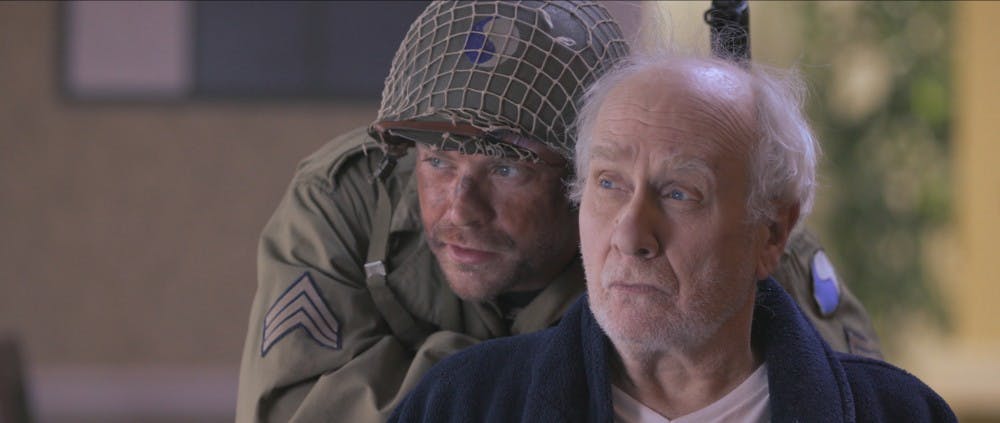With the help of several Ball State alumni and four years of writing, workshopping and entering his screenplay into festivals, alumnus Benjamin Dewhurst produced an award winning short film, SARGE.
The film has won several awards including best drama at the St. Louis Filmmakers Showcase and the official selection at the Southwest Indiana Film Festival, the Covellite International Film Festival, the Veterans Film Festival and the 2017 Heartland Film Festival.
The story follows a World War II veteran through his daily routine while living in a nursing home. Sergeant Franklin Spencer, the main character, suffers from several illnesses such as post-traumatic stress disorder and a form of Alzheimer's disease.
While producing the film, Dewhurst drew inspiration from his own experiences. He was raised by his grandparents, his grandfather is a World War II veteran, and spent a lot of time with them in the nursing home.
“Since I have an emotional connection to the story, there were moments when it was hard to work on the film,” Dewhurst said. “I would say that especially in the writing process. I tend to get emotional when I’m writing anyway because I’m investing into the story.”
That emotional attachment only grew when Dewhurst saw pieces of his grandfather in Richard Henzel, who portrayed Sergeant Spencer. Throughout the film, Dewhurst made several small touches to honor his grandfather, like placing his World War II private photo in the background.
The idea for SARGE came while Dewhurst was producing a different film with Ball State alumnus Brian Lauziere. Lauziere mentioned a short story that he had been working on and Dewhurst was intrigued, getting permission to turn the short story into a screenplay.
Dewhurst first had trouble finding support for the film. But when Avant Healthcare, the company he works for, held an innovation festival, Dewhurst knew it was the opportunity he had been waiting for.
Avant specializes in medical storytelling and holds festivals as an opportunity for their staff to improve, so it didn't take long for Dewhurst's screenplay to get reviewed and gain approval for production.
“Because Avant was funding it for us and supporting us so much, we wanted to make sure we’re telling a medically sound story,” Alex Faurote, Ball State alumnus and editor of SARGE, said.
While filming at The Crownpointe of Carmel, a nursing home, members of the staff also reviewed the script to ensure accuracy.
After Ball State alumnus Scott Tucker reviewed headshots and audition tapes for the cast, he sat down with Dewhurst and assistant director Glenn Pratt to review. Once callbacks were complete, Dewhurst held numerous rehearsals and had in-depth discussions to ensure the actors had a clear vision of the characters.
“He is very good at being descriptive about what it is he is looking to see so there wasn’t necessarily a whole lot of ‘Are we doing this right? Are we going to have to redo this?'” Ball State alumna Hannah Hodges said. “Everyone was able to be on the same page and vision.”
He focused on the acting, saying that directors get the best results when they "bear their souls to the actors."
“You have to be incredibly comfortable speaking in emotional language because you have to be able to convey who the characters are to them and work with them to develop the character out of their own inspiration,” Dewhurst said.
When it finally came time to film, the cast and crew ran on an ambitious schedule – completing most of the filming in about five days.
With the tight schedule, Dewhurst stayed involved in many of the aspects of filming, but he had confidence in his staff using their own talents and knowledge.
“Even though every portion of the film takes a lot of input from the director, hiring talented department heads is critical because it allows you to go off to do other things,” Dewhurst said. “I learned early in college that you can’t be the master of everything in life. You cannot do all of the work, you have to team yourself with specialists.”
Like Dewhurst, many of the crew members were involved in several aspects of the film’s production as well.
Tucker acted as both the casting director and one of the films associate producers. Faurote worked as editor, but he was on set every day making suggestions and taking notes of what angles or takes Dewhurst preferred so that he would have more to work with when it came time to edit.
Hodges did not hold an executive title, but she was able to do whatever job was needed on set. With the combined effort, the production of SARGE was able to run quick and smooth.
While the story is moving to Dewhurst, he doesn't feel that it's up to his standards. Dewhurst quietly picks apart his film every time he sees it, but hearing and watching how other people react is where he finds success.
He was truly happy with what he had done when the person he made the film for, whose name he won't say, approached him.
“That person came to me and organically, without me saying something to them, told me how much they loved the film," Dewhurst said. "My mind was blown because they didn’t know that they are the person that I was thinking about while making the short film.”
Many different film festivals and opportunities are on the horizon for SARGE and Dewhurst hopes to continue to get feedback.





